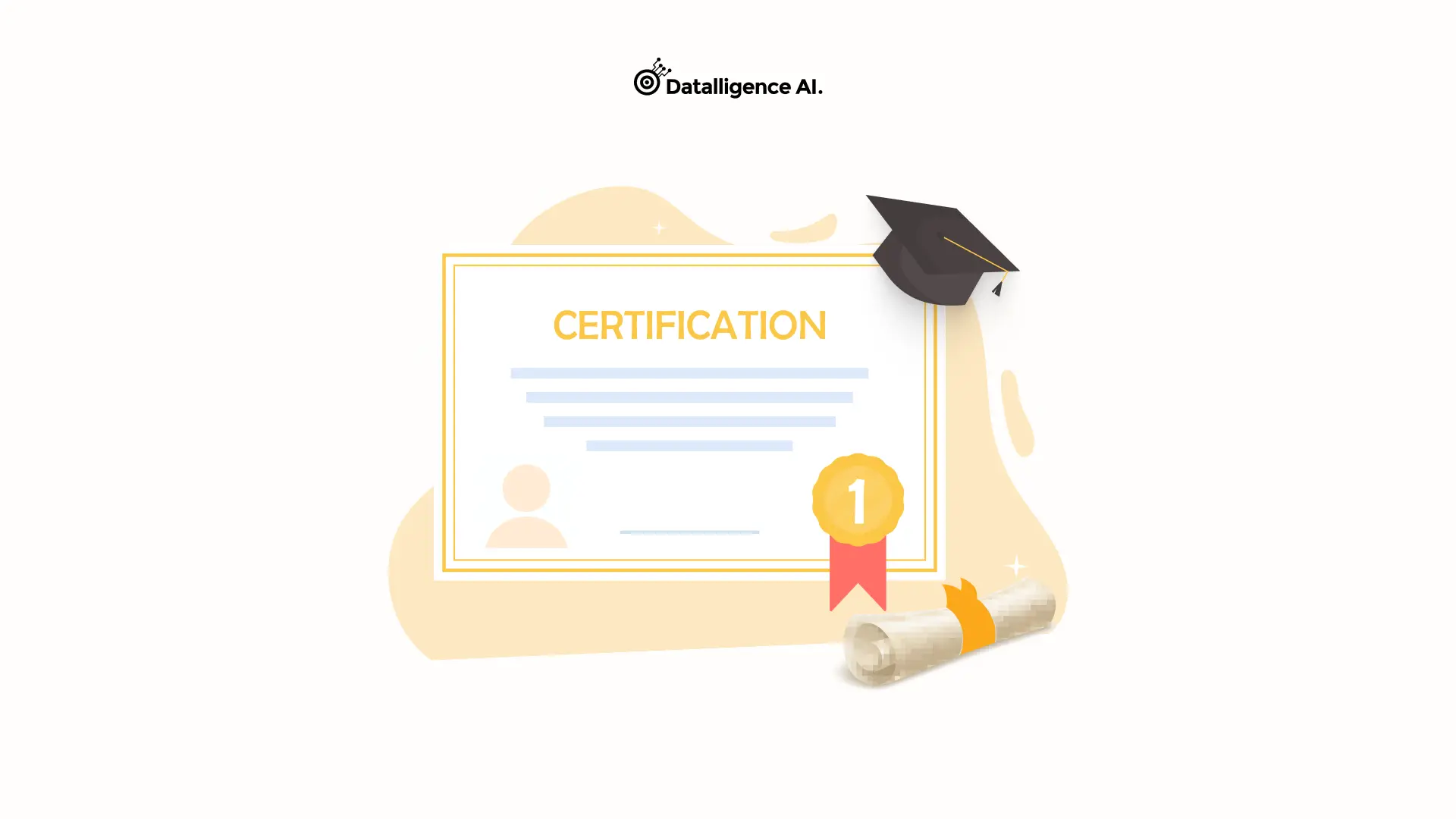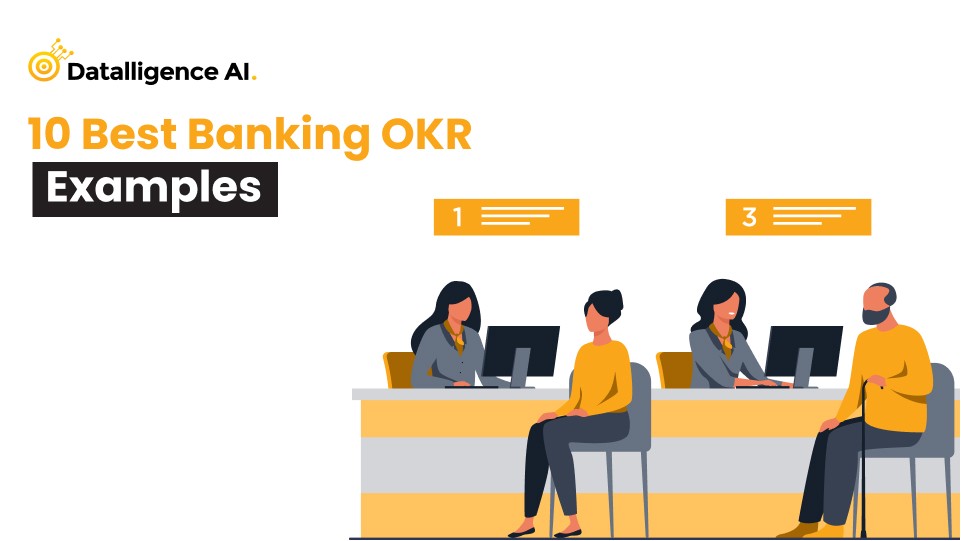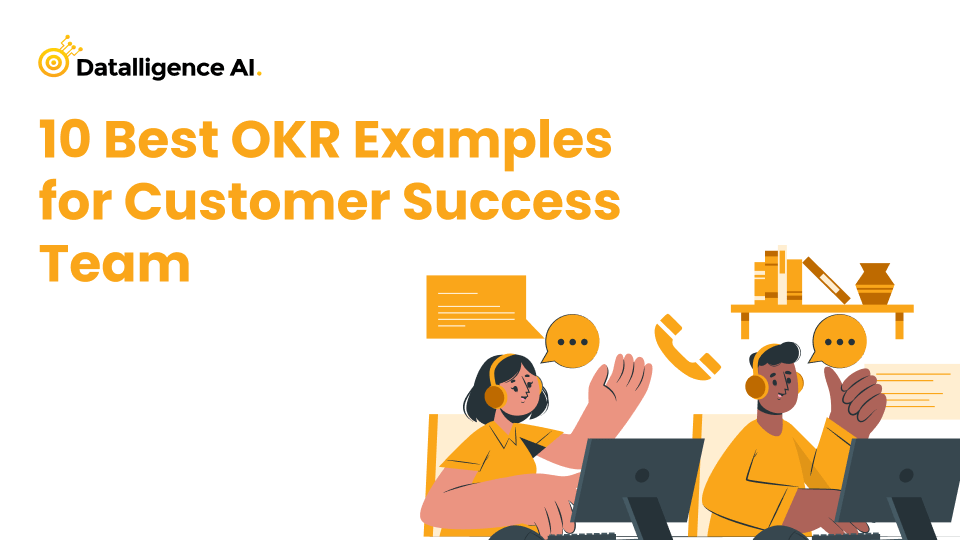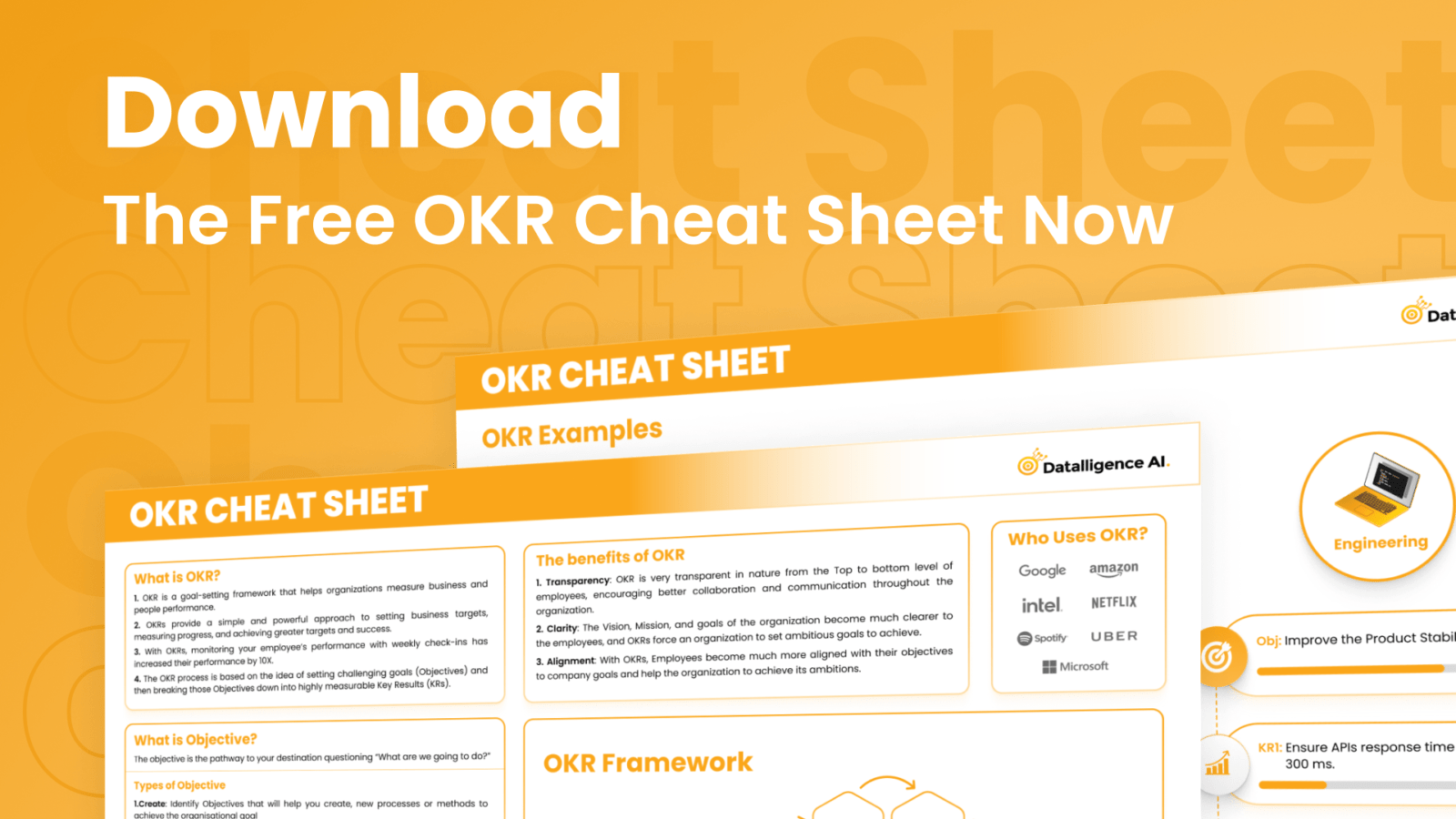Organizations in today’s fast-changing business world are continually searching for new ways to manage groups, promote performance, and achieve their strategic goals. One framework that has seen a lot of popularity is the Objectives and Key Results (OKRs). This system of goal setting and management has proved its efficacy in creating a transparent culture, fostering accountability, and constant improvement.
However, to truly benefit from OKRs one must have an in-depth knowledge of how it works. This is where OKR certification becomes a game-changer by providing professionals with the necessary insights to deploy OKRs successfully in order to take their careers further and lead their organizations toward unimaginable levels of achievement.
Table of Contents
The Essence of OKRs: A Primer
Before delving into the world of OKR certification, it’s crucial to grasp the fundamentals of the OKR framework. OKRs are a structured approach to goal-setting and performance tracking, consisting of two key components:
- Objectives: These are the overarching goals that an organization, team, or individual aims to achieve within a specific timeframe, typically a quarter or a year.
- Key Results: Key Results are the measurable and quantifiable outcomes that indicate progress toward achieving the defined Objectives.
The merit of OKRs is in their ability to promote uniformity, purposefulness and answerability at all levels of an organization. Teams can collectively work their way towards shared objectives, keep track of development openly, and make data-based decisions aimed at continuous growth through well-laid-out goals, clear ambitious objectives along with quantifiable results.
Decoding the OKR Methodology: A Catalyst for Strategic Excellence
The strive forward into the world of OKR certification, therefore, requires one to understand what this transforming framework entails. Fundamentally, OKR methodology develops a culture of transparency, responsibility, and continuous improvement. It coaxes companies to clearly state their objectives in terms that are measurable and also articulate their key results.
On the other hand, traditional goal-setting approaches usually focus on the intersection of alignment, agility, and data-oriented thinking. By deploying objectives throughout an organization, all levels of teams may participate in shaping the overall strategic vision which creates a feeling of unity towards a common purpose.
The Compelling Case for OKR Certification
Nowadays flexibility and strategic implementation are essential elements thus OKR certification is becoming an invaluable advantage for professionals intending to take their careers to a new level by driving organizational success. Moreover, this specialized training’s advantages go beyond just gaining knowledge but also include personal development as well as professional recognition with real business impact.
1. Enhancing Strategic Prowess
OKR certification equips individuals with the tools and frameworks necessary for effective strategic planning and execution. By mastering the art of setting clear, measurable objectives and defining key results, certified professionals can navigate the complexities of goal-setting with confidence. This heightened strategic acumen translates into improved decision-making, resource allocation, and the ability to align teams towards a common vision.
2. Fostering Organizational Alignment and Collaboration
Effective implementation of OKRs hinges on seamless alignment and collaboration across teams and departments. OKR certification empowers professionals to facilitate cross-functional alignment, ensuring that individual and team objectives are cohesively linked to the broader organizational goals. This synergy cultivates a collaborative culture where teams work in unison, leveraging their collective strengths to drive progress and achieve shared objectives.
3. Driving Performance and Accountability
The OKR framework is known for many aspects but most importantly its continuous performance monitoring and accountability are the hallmarks of this framework. For instance, professionals who have undergone the OKR certification program learn how to create clear metrics that help them track their objectives as well as make informed decisions based on the collected data. Such open lines of communication are quite essential in making an organization become a high-performing institution where every team takes its own responsibilities very seriously.
4. Accelerating Career Growth and Recognition
The job market has become increasingly competitive with time; therefore obtaining OKR certification can be a key differentiator between you and other candidates since it demonstrates your commitment towards personal growth as well as your ability to master an extremely demanded set of skills. Some people who have managed to get certified in that area today are widely seen as experts in the field of goal setting, management of employee’s performance or even execution strategies hence opening various opportunities for career growth, leadership positions, and reputation building within ones industry.
5. Fostering a Culture of Innovation and Agility
OKRs thrive in dynamic environments, encouraging organizations to embrace change and foster a culture of innovation. OKR certification imparts the knowledge and techniques required to adapt objectives and key results to evolving circumstances, enabling teams to pivot swiftly and capitalize on emerging opportunities. This agility empowers organizations to stay ahead of the curve and maintain a competitive edge.
Embarking on the OKR Certification Journey
Recognizing the immense value of OKR certification, the next step is to embark on a comprehensive training program tailored to your specific needs and aspirations. The landscape of OKR certification offerings is diverse, encompassing various formats, durations, and focus areas. Here’s a guide to help you navigate this journey:
1. Assessing Your Learning Objectives
Before selecting an OKR certification program, take the time to assess your specific learning objectives and goals. Are you seeking a foundational understanding of OKRs, or do you require advanced training in facilitating OKR implementation across your organization? Clearly defining your objectives will help you choose the most appropriate program.
2. Evaluating Program Content and Delivery
Examine the program content and delivery methods to ensure they align with your preferred learning style and accommodate your schedule. Some programs offer online courses with self-paced modules, while others provide immersive workshops or blended learning experiences. Additionally, consider the expertise and credentials of the instructors, as their real-world experience can significantly enrich your learning journey.
3. Investing in Continuous Learning and Development
OKR certification is not a one-time event but rather a commitment to ongoing learning and development. Seek programs that offer post-certification support, access to resources, and opportunities for continued education. This will ensure you remain at the forefront of best practices and can adapt to the evolving OKR landscape.
Overcoming Challenges in OKR Implementation
While the benefits of OKR certification are numerous, the journey is not without its challenges. Implementing OKRs within an organization can encounter resistance, misalignment, and measurement complexities. However, certified professionals are equipped with the knowledge and strategies to navigate these hurdles effectively.
1. Addressing Resistance to Change
Introducing a new goal-setting framework like OKRs can often face resistance from teams or leadership accustomed to traditional methods. OKR certification provides insights into effective change management strategies, including communication techniques and approaches to foster buy-in and engagement across the organization.
2. Ensuring Objective Alignment
Aligning objectives across various levels and functions within an organization is a critical aspect of successful OKR implementation. Certified professionals learn techniques for cascading objectives seamlessly, ensuring that individual and team goals contribute to the broader organizational vision.
3. Measuring Key Results Accurately
Defining and measuring key results accurately is a skill that requires practice and expertise. OKR certification programs delve into the nuances of setting measurable, outcome-based key results and leveraging data-driven insights to track progress effectively.
4. Adapting to Dynamic Environments
The agility inherent in the OKR framework is both a strength and a challenge. OKR certification equips professionals with the tools and mindset to adapt objectives and key results in response to changing circumstances, enabling organizations to pivot swiftly while maintaining strategic focus.
Advanced OKR Concepts: Mastering the Art of Strategic Execution
For those seeking to elevate their OKR expertise to the next level, advanced OKR certification programs offer a deep dive into specialized concepts and techniques. These programs explore topics such as:
1. OKRs for Innovation
Explore how OKRs can fuel innovation within organizations by fostering a culture of experimentation and creative thinking. Learn from case studies of companies that have leveraged OKRs to drive breakthrough ideas and stay ahead in competitive markets.
2. Cascading OKRs Throughout the Organization
Master the art of cascading objectives seamlessly throughout an organization, ensuring alignment across various levels and functions. Gain insights into techniques for facilitating collaborative goal-setting and maintaining a unified strategic direction.
3. OKRs and Performance Management
Discover how OKRs can transform traditional performance reviews by enabling continuous performance management. Learn how to leverage OKRs to provide real-time feedback, recognition, and coaching, fostering a culture of ongoing development and growth.
4. Balancing Stretch Goals and Attainability
Achieving the right balance between ambitious, stretch goals and realistic, attainable outcomes is an art form. Advanced OKR certification programs impart strategies for setting challenging yet achievable objectives, inspiring teams to push boundaries while maintaining a sense of purpose and motivation.
The Path to Becoming an OKR Coach and Consultant
For those aspiring to take their OKR expertise to new heights, the path to becoming an OKR coach or consultant offers a rewarding and impactful career trajectory. As an OKR coach or consultant, you’ll have the opportunity to guide organizations through the transformative journey of OKR implementation, fostering alignment, driving results, and cultivating a culture of continuous improvement.
1. OKR Coach Certification
OKR coach certification programs provide comprehensive training in facilitating OKR adoption and implementation within organizations. These programs equip you with the skills to guide leadership teams, facilitate OKR-setting workshops, and support teams at all levels in embracing the OKR mindset.
2. OKR Consultant Roles
As a certified OKR consultant, you can leverage your expertise to advise organizations on strategic goal-setting, performance management, and the effective integration of OKRs into their existing processes and systems. This role often involves conducting assessments, providing tailored recommendations, and supporting the implementation of OKR best practices.
3. Building a Consulting Practice
For those with entrepreneurial aspirations, building an OKR consulting practice can be a rewarding endeavor. By leveraging your certification and expertise, you can offer advisory services, workshops, and coaching to organizations seeking to unlock the transformative power of OKRs.
Choosing the Right OKR Certification Provider
With the growing popularity of OKRs, the market is teeming with certification providers, each offering unique programs and approaches. To ensure you make an informed decision, consider the following factors when evaluating potential providers:
1. Instructor Expertise and Experience
The quality of your learning experience is heavily influenced by the expertise and real-world experience of the instructors. Seek programs led by seasoned OKR practitioners and consultants who can share practical insights, case studies, and best practices from their extensive experience.
2. Program Structure and Delivery
Evaluate the program structure and delivery methods to ensure they align with your learning preferences and schedule. Consider factors such as the duration of the program, the balance between theoretical and practical components, and the availability of online, in-person, or blended learning options.
3. Post-Certification Support and Resources
Continuous learning and development are essential in the dynamic world of OKRs. Prioritize certification providers that offer post-certification support, access to ongoing resources, and opportunities for networking and knowledge-sharing within the OKR community.
WHO IS THIS COURSE FOR?
The Certified OKR Practitioner Level 1 program by OKR International is perfect for individuals tasked with spearheading change and strategy initiatives
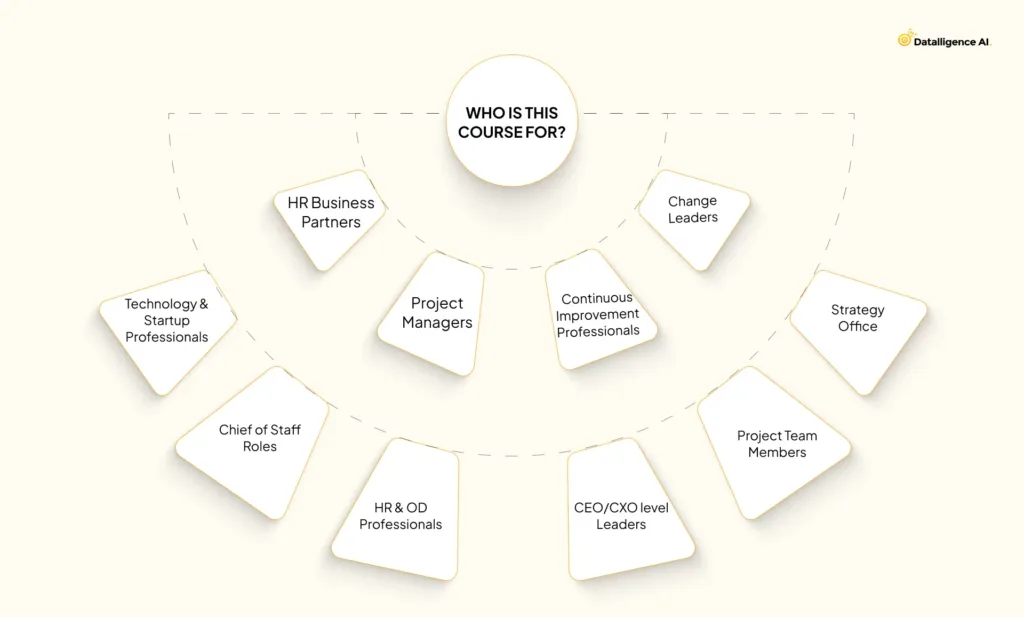
Join the Upcoming OKR Coach Certification Workshop
Are you ready to enhance your strategic skills and drive your organization to new heights? Enroll in Datalligence’s Certified OKR Practitioner program and embark on the journey to mastering OKRs!
- Dates: Upcoming
This is an online event. For more details and to register, contact us at pcr@datalligence.ai.
Embracing the Transformative Power of OKRs with Datalligence.ai
At Datalligence.ai, we understand the transformative power of OKRs and the importance of cultivating a team of certified professionals to drive strategic success. Our comprehensive OKR certification training programs are designed to equip you with the knowledge, skills, and expertise to navigate the complexities of goal-setting, performance management, and organizational alignment.
Our expert trainers, with years of real-world experience in implementing OKRs across diverse industries, will guide you through an immersive learning journey. You’ll gain mastery in setting high-quality Objectives and Key Results, facilitating OKR-setting sessions, aligning goals across different organizational levels, and measuring progress effectively.
By becoming a certified OKR professional with Datalligence.ai, you’ll not only elevate your career but also contribute to the success of your organization. Join us on this transformative journey and unlock your full potential as a strategic leader in the ever-evolving world of business.

